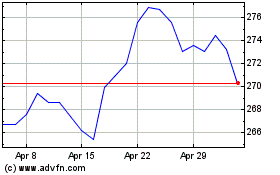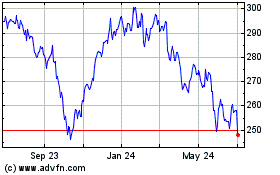EU to Propose Multinationals Disclose More Tax Details
April 08 2016 - 2:50PM
Dow Jones News
BRUSSELS—Large multinational companies such as Google Inc., IKEA
and Amazon Inc. will be forced to publish profits and tax bills
from European Union countries in which they operate, under plans
the bloc's executive will bring forward next week.
The proposal to open up so-called country-by-country reporting
will be presented Tuesday and forms part of a broader effort by the
European Commission to ensure companies don't skimp on their taxes.
Similar rules already apply to EU banks.
Under the plan, EU companies with annual revenue of more than
€750 million ($856 million) will have to publish a report on income
and tax information that will be made accessible to the public. The
rules will also apply to medium and large subsidiaries of non-EU
companies operating within the 28-country bloc.
In January, the commission proposed a series of rules aimed at
stopping large-scale corporate tax avoidance in Europe, where
governments are struggling to close budget gaps in the wake of the
financial crisis. Those proposals included country-by-country
reporting for large companies but limited the information to tax
authorities.
The push to make the detailed reports public came after
newspapers around the world uncovered thousands of offshore
accounts allegedly held by officials, executives and celebrities.
The trove of emails and data on the accounts were allegedly leaked
from the Panamanian law firm Mossack Fonseca.
"After the Panama papers, there must not be a single hesitation
from anybody that we need a public country-by-country reporting,"
said Pierre Moscovici, the EU's taxation commissioner.
Around 6,500 companies world-wide could be covered by the
proposed rules, 2,000 of which are based in Europe, according to EU
officials.
The proposed disclosures, however, don't cover multinationals'
operations in countries outside the EU. That has drawn fire from
tax transparency campaigners, who argue that tax havens, where many
companies shift their profits, should fall under the new rules.
Instead, companies would publish data on their activities outside
the EU as an aggregate and not broken down by country.
"It would be very embarrassing for the commission if its new
flagship tax-transparency rules will still allow companies to get
away with the kind of dodgy practices exposed by the Panama
Papers," said Elena Gaita, a policy officer for corporate
transparency at Transparency International, the global
anticorruption group.
Mr. Moscovici signaled that there could be some last-minute
tweaks to the plan to account for operations in tax havens. "After
the Panama papers we will have the political capacity to go
further," he said.
EU authorities are still reeling from revelations in 2014 that
many multinational companies struck sweetheart deals in countries
such as Luxembourg that allowed them to pay little tax in the bloc.
The commission has launched a series of investigations into special
tax deals for multinationals, which it said could amount to illegal
state subsidies.
The European Parliamentary Research Service estimated corporate
tax-avoidance costs EU countries between €50 billion and €70
billion in revenue each year.
Still, tax-transparency campaigners said next week's proposal
should be more ambitious, because the €750 million revenue
threshold lets too many multinationals off the hook. EU officials
argue the threshold covers all the companies that can afford
"aggressive tax planning," which takes advantage of loopholes and
mismatches in different tax systems to reduce bills.
Transparency campaigners also said the proposal doesn't ask
companies to publish enough information. But EU officials and
companies said asking companies to divulge potentially commercially
sensitive information could put them in a weaker position compared
with competitors operating elsewhere.
Irene Yates, McDonald's Corp.'s vice president for corporate
tax, told European lawmakers last month that it would be better to
keep country-by-country tax and profit reports out of the public
eye. It is important "to keep information confidential when sharing
between tax authorities," she said.
The proposal will still have to be agreed by EU governments and
the European Parliament before becoming law, a process which could
take months.
Natalia Drozdiak contributed to this article.
Write to Viktoria Dendrinou at viktoria.dendrinou@wsj.com
(END) Dow Jones Newswires
April 08, 2016 14:35 ET (18:35 GMT)
Copyright (c) 2016 Dow Jones & Company, Inc.
McDonalds (NYSE:MCD)
Historical Stock Chart
From Mar 2024 to Apr 2024

McDonalds (NYSE:MCD)
Historical Stock Chart
From Apr 2023 to Apr 2024
